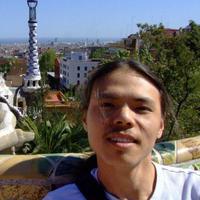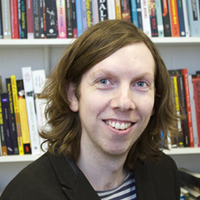
Chris Pak
Editor-in-Chief of the Science Fiction Research Association's SFRA Review.
Research Fellow on the Leverhulme funded project 'People, Products, Pests and Pets: The Discursive Representation of Animals'. More information about this project can be found here: https://animaldiscourse.wordpress.com.
Member of the Science Fiction Research Association (SFRA), the Association for the Study of Literature and the Environment, UK and Ireland (ASLE-UKI) and the British Society for Literature and Science (BSLS).
I specialise in science fiction and am particularly drawn to ecocriticism, global politics and the relationship between the sciences, philosophy and the arts. I also maintain an interest in other contemporary literatures, including postmodernism, American literature, fantasy, horror and noir. My PhD thesis considers the eco-philosophical and eco-political engagement of science fictional narratives of global planetary adaptation, or terraforming. It considers the environmental philosophical notion of nature’s otherness and respect for the non-human, the cognitive and physical processes involved in landscaping, and the use of the pastoral, ecology and science in terraforming narratives.
I have been awarded the 2013 Mary Kay Bray Award from the Science Fiction Research Association and the 2011 Foundation Essay Prize for two of my articles.
Supervisors: Mr. Andy Sawyer and Dr. Siobhan Chapman
Research Fellow on the Leverhulme funded project 'People, Products, Pests and Pets: The Discursive Representation of Animals'. More information about this project can be found here: https://animaldiscourse.wordpress.com.
Member of the Science Fiction Research Association (SFRA), the Association for the Study of Literature and the Environment, UK and Ireland (ASLE-UKI) and the British Society for Literature and Science (BSLS).
I specialise in science fiction and am particularly drawn to ecocriticism, global politics and the relationship between the sciences, philosophy and the arts. I also maintain an interest in other contemporary literatures, including postmodernism, American literature, fantasy, horror and noir. My PhD thesis considers the eco-philosophical and eco-political engagement of science fictional narratives of global planetary adaptation, or terraforming. It considers the environmental philosophical notion of nature’s otherness and respect for the non-human, the cognitive and physical processes involved in landscaping, and the use of the pastoral, ecology and science in terraforming narratives.
I have been awarded the 2013 Mary Kay Bray Award from the Science Fiction Research Association and the 2011 Foundation Essay Prize for two of my articles.
Supervisors: Mr. Andy Sawyer and Dr. Siobhan Chapman
less
Related Authors
Joseph Carroll
University of Missouri - St. Louis
Sarah Pink
Monash University
Andreas Philippopoulos-Mihalopoulos
University of Westminster
Galen Strawson
The University of Texas at Austin
Iain Robert Smith
King's College London
Na'ama Pat-El
The University of Texas at Austin
Michael Spivey
University of California, Merced
Nils Markusson
Lancaster University
Gloria ORIGGI
EHESS-Ecole des hautes études en sciences sociales
Murat Akser
University of Ulster
InterestsView All (76)










Uploads
Books by Chris Pak
'Pak’s magisterially complete history of the idea of terraforming marks an important milestone in science fiction studies. He rightly sees the terraforming concept as the ideal test-bed for an astonishingly wide range of crucial gedankenexperiments in many fields. His analysis of the social, political, philosophical, spiritual, and moral dilemmas that the terraforming genre offers—humanity’s place in nature only the most obvious--makes this a book of importance far beyond the science fiction community.' Frederick Turner
Terraforming: Ecopolitical Transformations and Environmentalism in Science Fiction is the first study to trace the historical development of environmental science fiction, and it convincingly frames this development within the genre’s representation of planetary adaptation...Pak’s is a very good book.
Professor Eric Otto, Florida Gulf Coast University
Papers by Chris Pak
Science fiction (sf) has explored visions of sustainable and unsustainable practices in the light of the transformations to society that technology brings. Through its capacity to create potentially educative spaces for reflection on a variety of ecological and environmental issues, sf can help answer the call for sustainability and sustainability science to expand its boundaries to include, not just ecological, economic, scientific and technological knowledge, but wider socio-political practices, lifestyles and thought from a variety of disciplines. This paper reconnoitres the engagement by writers such as H.G. Wells and John Brunner with themes and issues now incorporated into the sustainability debate, and considers how Frederick Pohl and C.M. Kornbluth, Ernest Callenbach and Kim Stanley Robinson portray the relationship between economics, society and the environment.
This article examines the motif of composting in Kim Stanley Robinson’s landmark Mars trilogy, a narrative of the colonisation and terraforming of Mars. It brings to bear Thierry Bardini’s notions of bootstrapping and ‘junk’ and Jed Rasula’s notions of ‘wreading’ and the compost library to analyse the significance of compost and soil in characterisations of terraforming. This article demonstrates the fruitful correspondences between these two theoretical approaches and underlies their close fit with Damien Broderick’s notion of the science fictional megatext. Thinking about literary texts and the terraforming narrative in terms of compost or junk, this article demonstrates how these themes are linked to the fundamental utopian drive that underlies the desire to terraform other planets and to remake social worlds.
Keywords
terraforming, compost, Robinson, Bardini, Rasula, intertextuality
Mark Bould [http://www.sf-encyclopedia.com/entry/bould_mark]
Robert Crossley [http://www.sf-encyclopedia.com/entry/crossley_robert]
Michael Andre-Driussi [http://www.sf-encyclopedia.com/entry/andre-driussi_michael]
Neil Easterbrook [http://www.sf-encyclopedia.com/entry/easterbrook_neil]
David Engebretson [http://www.sf-encyclopedia.com/entry/engebretson_david]
Richard D. Erlich [http://www.sf-encyclopedia.com/entry/erlich_richard_d]
Bud Foote [http://www.sf-encyclopedia.com/entry/foote_bud]
Carl Freedman [http://www.sf-encyclopedia.com/entry/freedman_carl]
Leslie A. Fiedler [http://www.sf-encyclopedia.com/entry/fiedler_leslie_a]
Danny Gresh [http://www.sf-encyclopedia.com/entry/gresh_danny]
S.T. Joshi [http://www.sf-encyclopedia.com/entry/joshi_s_t]
Sylvia Kelso [http://www.sf-encyclopedia.com/entry/kelso_sylvia]"
'Pak’s magisterially complete history of the idea of terraforming marks an important milestone in science fiction studies. He rightly sees the terraforming concept as the ideal test-bed for an astonishingly wide range of crucial gedankenexperiments in many fields. His analysis of the social, political, philosophical, spiritual, and moral dilemmas that the terraforming genre offers—humanity’s place in nature only the most obvious--makes this a book of importance far beyond the science fiction community.' Frederick Turner
Terraforming: Ecopolitical Transformations and Environmentalism in Science Fiction is the first study to trace the historical development of environmental science fiction, and it convincingly frames this development within the genre’s representation of planetary adaptation...Pak’s is a very good book.
Professor Eric Otto, Florida Gulf Coast University
Science fiction (sf) has explored visions of sustainable and unsustainable practices in the light of the transformations to society that technology brings. Through its capacity to create potentially educative spaces for reflection on a variety of ecological and environmental issues, sf can help answer the call for sustainability and sustainability science to expand its boundaries to include, not just ecological, economic, scientific and technological knowledge, but wider socio-political practices, lifestyles and thought from a variety of disciplines. This paper reconnoitres the engagement by writers such as H.G. Wells and John Brunner with themes and issues now incorporated into the sustainability debate, and considers how Frederick Pohl and C.M. Kornbluth, Ernest Callenbach and Kim Stanley Robinson portray the relationship between economics, society and the environment.
This article examines the motif of composting in Kim Stanley Robinson’s landmark Mars trilogy, a narrative of the colonisation and terraforming of Mars. It brings to bear Thierry Bardini’s notions of bootstrapping and ‘junk’ and Jed Rasula’s notions of ‘wreading’ and the compost library to analyse the significance of compost and soil in characterisations of terraforming. This article demonstrates the fruitful correspondences between these two theoretical approaches and underlies their close fit with Damien Broderick’s notion of the science fictional megatext. Thinking about literary texts and the terraforming narrative in terms of compost or junk, this article demonstrates how these themes are linked to the fundamental utopian drive that underlies the desire to terraform other planets and to remake social worlds.
Keywords
terraforming, compost, Robinson, Bardini, Rasula, intertextuality
Mark Bould [http://www.sf-encyclopedia.com/entry/bould_mark]
Robert Crossley [http://www.sf-encyclopedia.com/entry/crossley_robert]
Michael Andre-Driussi [http://www.sf-encyclopedia.com/entry/andre-driussi_michael]
Neil Easterbrook [http://www.sf-encyclopedia.com/entry/easterbrook_neil]
David Engebretson [http://www.sf-encyclopedia.com/entry/engebretson_david]
Richard D. Erlich [http://www.sf-encyclopedia.com/entry/erlich_richard_d]
Bud Foote [http://www.sf-encyclopedia.com/entry/foote_bud]
Carl Freedman [http://www.sf-encyclopedia.com/entry/freedman_carl]
Leslie A. Fiedler [http://www.sf-encyclopedia.com/entry/fiedler_leslie_a]
Danny Gresh [http://www.sf-encyclopedia.com/entry/gresh_danny]
S.T. Joshi [http://www.sf-encyclopedia.com/entry/joshi_s_t]
Sylvia Kelso [http://www.sf-encyclopedia.com/entry/kelso_sylvia]"
In this talk I examine how terraforming narratives have imagined the Sun's centrality as a source of energy for new life in works such as Frederick Turner’s Genesis and Kim Stanley Robinson’s 2312, among others. I aim to show how biospheres feature in these narratives and how they provide a model for the adaptation of planetary environments. I also consider how sf has melded scientific and metaphoric language to promulgate new myths based in science that attempt to locate humankind within a broad, evolutionary perspective to provide a narrative of our place in the universe.
In Kim Stanley Robinson’s (2002) The Years of Rice and Salt, scenes set in the Bardo, an intermediate state between death and rebirth in Tibetan Buddhism, introduces a frame for reflecting on the game of history played out it the text. The figure of Monkey from Journey to the West emblematises the play of the alternative history. In this paper I examine the ways in which the alternate history is used to present history and the development of societies in the context of an absent Europe. I consider the use of textual strategies such as the narrative cohesion generated through the reincarnation of focal characters and explore several scenes to consider what they say about history and culture. Ultimately, I aim to explore how The Years of Rice and Salt portrays the actors who make up the story of history, how this history is itself characterised and what repercussions these explorations have for reading the stories that make up contemporary “real-world” history.